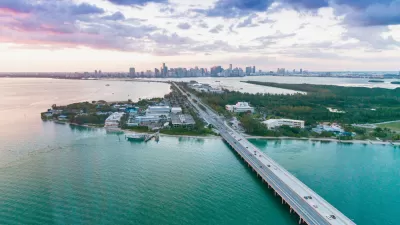Bloggers, pundits, authors, and researchers, have made the case for conservatives to embrace the effects of smart growth. Yet still, a distinctly partisan divide flavors the debate about how to make room for a growing number of Americans.

An article by Andrew Keatts digs into the question of why conservatives are resistant to the ideas of smart growth—despite a growing body of research and literature connecting the ideologies of conservative politics and smart growth.
The article follows a paper by Arizona State University professor Paul G. Lewis, titled "Moral Intuitions and Smart Growth: Why do Liberals and Conservatives View Compact Development so Differently [pdf]." Keatts explains one of the findings of Lewis's research: after controlling or race and income, "[s]imply being conservative made people 10 percent less likely to supporting urban development."
But why are conservatives so willing to ignore the expensive government policies and subsidies that enable sprawling development, such as the home mortgage interest deduction and highway construction? Lewis's paper argues that it's the result of "deep-seated, subconscious emotions."
That gut feeling, as it were, is in the realm of a field of study from social psychology known as "social intuitism." Keatts explains: "Essentially, liberals and conservatives are predisposed to certain flash judgments that they don’t recognize, then they rationalize explanations for their views."
The article also explains more about how Lewis's research makes an initial attempt to "demonstrate a connection between moral intuitionism and views on urban development" in the absence of a large-scale study.
FULL STORY: Why Urbanism Is Considered to be ‘Liberal’

Maui's Vacation Rental Debate Turns Ugly
Verbal attacks, misinformation campaigns and fistfights plague a high-stakes debate to convert thousands of vacation rentals into long-term housing.

Planetizen Federal Action Tracker
A weekly monitor of how Trump’s orders and actions are impacting planners and planning in America.

In Urban Planning, AI Prompting Could be the New Design Thinking
Creativity has long been key to great urban design. What if we see AI as our new creative partner?

Pedestrian Deaths Drop, Remain Twice as High as in 2009
Fatalities declined by 4 percent in 2024, but the U.S. is still nowhere close to ‘Vision Zero.’

King County Supportive Housing Program Offers Hope for Unhoused Residents
The county is taking a ‘Housing First’ approach that prioritizes getting people into housing, then offering wraparound supportive services.

Researchers Use AI to Get Clearer Picture of US Housing
Analysts are using artificial intelligence to supercharge their research by allowing them to comb through data faster. Though these AI tools can be error prone, they save time and housing researchers are optimistic about the future.
Urban Design for Planners 1: Software Tools
This six-course series explores essential urban design concepts using open source software and equips planners with the tools they need to participate fully in the urban design process.
Planning for Universal Design
Learn the tools for implementing Universal Design in planning regulations.
planning NEXT
Appalachian Highlands Housing Partners
Mpact (founded as Rail~Volution)
City of Camden Redevelopment Agency
City of Astoria
City of Portland
City of Laramie




























